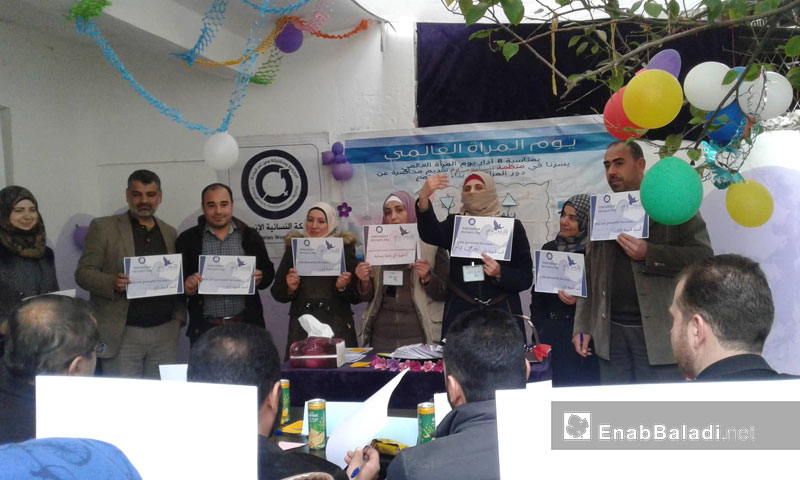“Space of Peace” Organization for Psychological and Social support, in the city of Ariha, in Rural Idlib, has organized an event under “International Women’s Day”, that is celebrated on March 8 every year.
The event presented a number of activities to many of women beneficiaries and others who managed to influence the Syrian society, in the presence of the President of Ariha’s Local Council and various media outlets.
The event, which Enab Baladi has covered, included a number of activities, a theatrical show and recreational intervals, which mostly focused on enhancing the role of Syrian women in the social, political and economic life, in addition to presenting a glimpse of Syrian women’s achievements since the past to the current time.
For her part, the event’s coordinator, Mrs. Maysson Bittar, told Enab Baladi that it is important to shed a light on the women’s role every year and all that she offers at different levels of interaction.
She added: “In ‘Space of Peace Organization,’ we celebrate the International Women’s Day every year, as a form of appreciation for all that women are offering. We have to pay a great attention to raise women’s awareness about their role in affecting society, especially at times of conflict and crises.”
The event also included a show case that presented the products of a number of beneficiary women, who are active in the filed of small home-based projects. These women, through the Organizations’ celebration, had the chance to show the people their handmade pieces, including wool handmade clothes.
In addition to the handicrafts show, the Organization also presented the artistic works of a Syrian girl, who lost her ability to hear and speak due to the war; works that the audience and the event’s visitors admired due to her talent and paintings both.
Nour, one of the women who benefited from the Organization’s Psychological Support Center, said that she was happy by the attention and the acre she received in Idlib on the International Women’s day, calling women to demand a leading and active role in society.
The event was concluded with a solidarity stand with the women of Ghouta and the women detained in the Syrian prisons, who have been subjected to ferocious violations for the past eight years, according to the event’s coordinator’s, Maysson Bittar, speech.
How Did the World Celebrate “International Women’s Day”?
The world has started celebrating the International Women’s Day since 1910, when a group of women organized an international conference in Denmark, with the aim to place pressure on the international community, as to achieve equality between men and women. The world, for the first time, celebrated this event in 1911.
The day’s original name used to be the “International Working Women’s Day”, but when the United Nations (UN) has officially adopted the day, in 1975, it turned its name to the “International Women’s Day”.
UN has organized various events in celebration of the International Women’s Day, for the year of 2018, that corresponds to March 8, in a discourse targeting women in the countryside.
“The Time is Now: Rural and urban activists transforming women’s lives”, is the slogan which the organization has launched to condemned the subjection and suppression which rural women are suffering around the world.
According to UN, rural women constitute more than a quarter of the world’s population; they plow the soil and plant seeds to feed nations; in return, they receive wages that are less than the money received by urban women.
UN also indicated that the gap between women and men wages has reached 23% around the world, while it is 40% in the countryside.
Rural women, especially in the third world, are suffering from discrimination at the level of education, healthcare, work, heritage, social protection from physical and sexual violence.
The numbers, issued by UN, estimate that the percentage of the rural women who lack basic reading and writing skills is more than the half of their total number, calling on the concerned entities to raise their awareness and to face the challenges that are ruled by traditions and the cultural heritage that has hegemony over these regions.

